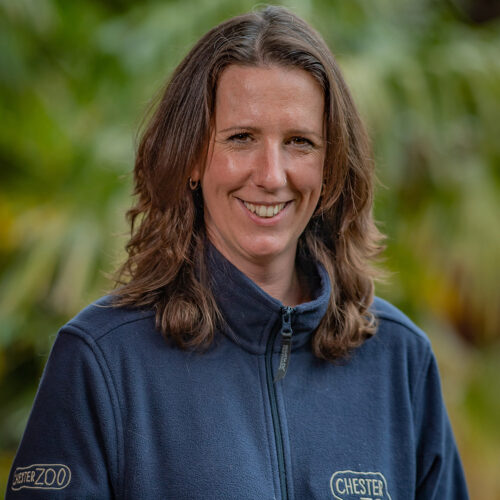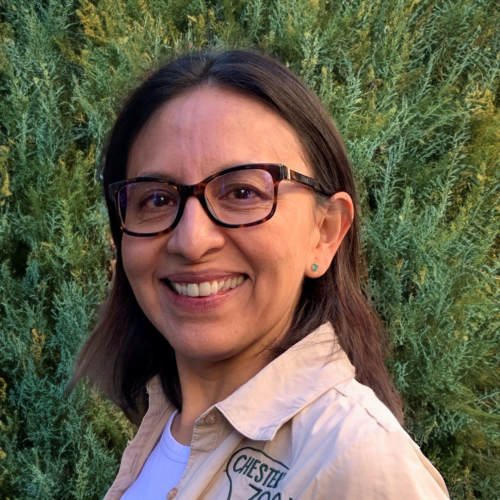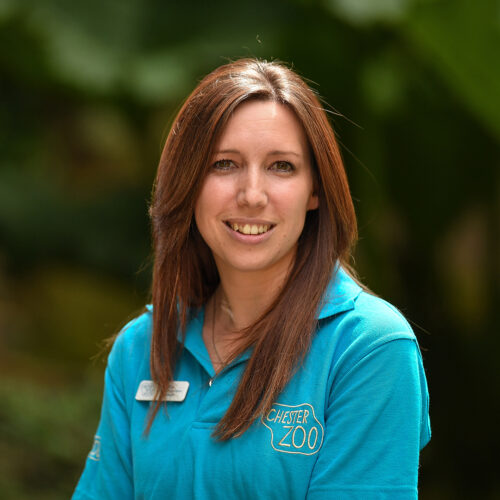This International Women’s Day we’re sharing the inspiring stories of women who are leading the way in conservation, and how their inclusion is making a tangible difference in the world.
In honour of this year’s theme of inclusion, we’re excited to share the stories of how women are being integrated into two vital conservation projects in Madagascar and Borneo. These projects not only aim to protect endangered species and their habitats but also strive to empower and uplift the local communities, especially the women who play a crucial role in the projects’ success. We also caught up with Dr Ximena Velez-Liendo, whose life’s work has centred around understanding and protecting Andean bears.
We’re working with a team of dedicated women in Madagascar to fight against deforestation through the Malagasy Nursery project, which aims to grow forest-saving hedges throughout local farmland.
In 2022, Dr. Claire Raisin, along with two Chester Zoo colleagues, visited a new project in Mahabo, Madagascar, alongside a team from Missouri Botanic Gardens (MBG). They explored the Agnalazaha Forest, one of the largest remaining fragments of littoral forest in Madagascar, found near the coast on sandy soil.
Local farmers rely on the land to grow crops, which need to be protected from freely roaming cattle. To do this they annually chop down woody stems from this forest to build fences, damaging its quality and making it vulnerable to fire and sea-winds. This deforestation threatens wildlife, including the critically endangered white-collared lemur. As a more sustainable solution, MBG is working with farmers to introduce hedge-like barriers instead, starting with temporary barbed wire fences while plants grow.
The project has since employed and trained 10 unmarried mothers in botanical nursery care techniques. A creche is provided for their children during working hours, and the staff receive training in skills like chicken rearing, hygiene, family planning, and maternal care.
These women’s efforts will produce plants for the hedges, including species with medicinal properties or edible fruit, ensuring a sustainable and diverse habitat.

“Not only are we helping to conserve highly threatened forest, we are changing lives, and the women we’re working with are brilliant. By providing jobs for unmarried and single mothers, we’ve really provided women with an opportunity they wouldn’t normally have access to.”
We’re proud to be helping to train the next generation of conservation scientists through our Conservation Training Academy, and from 2011–2024, 65% of current members and alumni of our Conservation Scholars and Fellows programme were women.
An alumni of the programme, Dr Ximena Velez-Liendo, has dedicated her career to studying and safeguarding Andean bears in Bolivia’s inter-Andean dry forests.
We recently had the opportunity to chat with Ximena about her passion for conservation and the advice she has for aspiring female conservationists. Here’s what she had to say:
“I studied Biology for my undergraduate degree in Bolivia. During my final year, I carried out research on how bears use their habitats, and during my very first day in the field I saw a bear in the wild! Whether it was a sign or not, here I am, 24 years later, still working with bears. Bears are wonderful creatures – powerful, majestic and with a special bond to humans.
“Currently, I’m the leader of the Andean Carnivore Conservation Program, where we focus on protecting bears, conserving, and restoring the inter-Andean dry forest, and helping people to coexist with carnivores. Supported by Fondation Segré, we’re aiming to expand our conservation initiative to protect more bears, more dry forests, and to provide communities and families with the tools and knowledge needed to reduce conflicts whilst benefiting from coexisting with bears.”

“To all the girls out there – keep asking, keep questioning, keep trying, and do not let anything or anyone stop you. Whether your dream is to touch the stars, digging to the centre of the planet, or finding out how bears communicate, do it!”
Working with our conservation partner, HUTAN, and local women, we’re creating wildlife corridors in Borneo to connect different areas of land, promoting safe movement for animals. These passionate women are reforesting regions, essential for sustainable palm oil production.
HUTAN’s Genting Wildlife Corridor (GWC), led by a team of local women since 2008, inspires both the community and the world. The 11-woman Nursery and Monitoring Team review reforested areas and develop research protocols.
After five years, there’s notable wildlife recolonisation, despite some seedling losses due to animals. This loss indicates a healthy ecosystem, fostering hope for biodiversity preservation.
Over 71,000 seedlings planted in total since 2019
22 different species planted
1,105 days of planting since the start of the project
This all female team was set up after men originally started to plant tree saplings to reconnect forest patches that had been fragmented due to the production of unsustainable palm oil. It was found that the male team couldn’t care for the trees in the way that was needed, so the team was expanded to hire local women instead. It takes three years from tree saplings being planted in the ground until they can be established, which requires a lot of monitoring and caring for the trees – a task which women from the local area excelled at.
It’s extremely rare for women to have permanent jobs in the Kinabatangan region, yet this project has seen a 100% female team spearheading an extensive landscape restoration project. Engaging with the local community like this is integral to reforestation efforts, as safeguarding and rejuvenating the area they live in will always hold greater significance for them than it could for anyone else.

“For us conservation is as much about the local communities as it is about the wildlife. It’s the local communities that are the custodians of the land going forward, so for us it’s really important to work with them.”
The production of unsustainable palm oil is one of the leading causes of deforestation in Borneo. You can do your part to protect nature by downloading our PalmOil Scan app, which empowers you to make informed purchasing decisions, and identify products produced with sustainable palm oil.